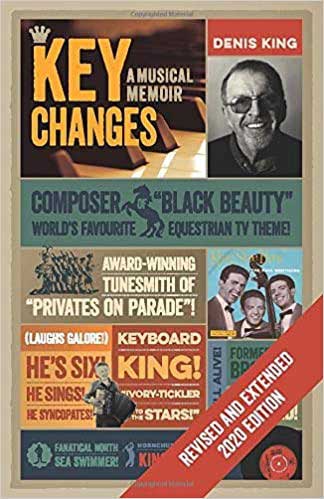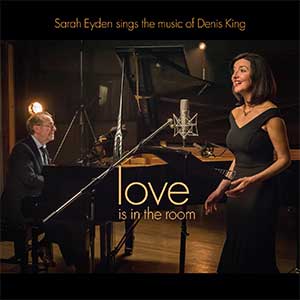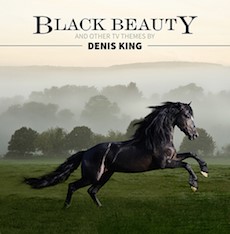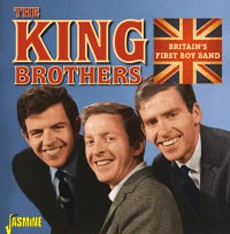
ORVIN - CHAMPION OF CHAMPIONS
Music by Denis King - Book and lyrics by Alan Ayckbourn
Presented by the Stephen Joseph Theatre and The National Youth Music Theatre.
Publisher:Samuel French Ltd
Music Publisher:Eaton Music
The chorus of gods sets out to relate the tale of the Great Ulmar, legendary warrior and chmapion of Sollistis, but their narrative suffers a major technical hitch when Orvin, Ullmar’s hopeless squire, oversleeps on the eve of battle. What follows proves a challenge to even such seasoned story tellers as the gods themselves as they vainly attempt to re-write history with only the help of Orvin--the unlikeliest, most reluctant of last minute champion replacements.

PERFORMANCES
First performed 7 August, 2003 Stephen Joseph Theatre, Scarborough
Director: Alan AyckbournAsst. Director: Laurie Sansom
Designer: Pip Leckenby
Costumes: Christine Wall
Lighting: Kath Geraghty
Choreography: Sheila Carter
Sound: Ben Vickers
Musical Director: Steven Markwick
Orchestrations: Denis King
CAST (15M, 6W, + Vocal Chorus)
As originally produced by the National Youth Music Theatre, Orvin featured a cast of over forty people:
Lee Drage, David Moss, Jim Webb, Dominic Tighe, Simon Eves, Georgina White, Ben Beechey, Anja Rodford, Jonathan Scott, Jasper Brownrigg, Jonathan McGovern, Ryan Milne,Gemma Hawkins, Chloe Hart, Olenka Drapan, Lucy Page, Isabel Ramsey, Freya Brett, John Sandeman, James Benn, Owen Visser, Alexander Nicholsen, Matt Willock, Ewan Jones
MUSICAL NUMBERS (demos)
Click on any track name in blue to listen to the track, use the controls on the right hand side to play, pause and stop the audio.
- CHORUS ONE
- I'M YOUR MAN
- DELCINE
- OLA'S SONG
- 'TILL DEATH
- THE ONE I WANT TO DIE FOR
- EVERYTHING IN HAND
- BAVAROIS DE FROMAGE BLANC
- SINCE I WAS A CHILD
Alan Ayckbourn writes: “I was first approached by the Artistic Director of the National Youth Music Theatre, Jeremy James Taylor, back in 1996 when we both met at one of Andrew Lloyd Webber's convivial Sydmonton Summer Festival bashes where you can, if you're lucky, hear some very good music, consume a lot of excellent wine and as a consequence make rash promises to strangers that you hope they won't hold you to the morning after.
It took Jeremy about five years to remind me of my own rash promise to him but back he came eventually asking if I'd still be interested in writing something original for production by the NYMT. My instinctive reaction was to say sorry but no; that I never write to commission, that I only ever these days produce new work for the Stephen Joseph Theatre in Scarborough (which I invariably direct myself ) and that, anyway, I think I'd had enough of the writing of musicals to last me the rest of my life.
But Jeremy then added some interesting terms: that there could be a first production in Scarborough, that I could direct it with a composer of my choosing and - to clinch it - that there was a possible maximum cast size of 45 available. How could a chap say no?
I had recently written a family musical play, Whenever, with composer Denis King and felt he might just be intrigued and equally rash enough to consider this proposal a challenge. He agreed and I set off to construct a book which I felt would best address the brief.
At first, it was the sheer scale of the prospective canvas that daunted me. A lifetime of subsidised regional theatre had conditioned me to thinking mainly in cast sizes of five or six or, if we were very good and saved up our actor weeks, of ten maximum. But forty-five? For a start where was I going to put them all? There was barely room for 45 actors on our small Scarborough stage to stand; certainly not if we were expecting them to move as well. Well, it would save on a choreographer.
But then I reasoned that although the NYMT has a fine reputation for discovering and developing some of our most exciting young musical and dramatic talent, given that the cast were going to be drawn fifty per cent locally and fifty per cent nationally, there were bound to be some who were stronger singers, some who were stronger actors and some, let's face it, who were just along for a good time, but who would be happy to have a go at anything and, what's more, get a real buzz out of simply being part of such a venture.
The show, then, became divided into 'principals' - actors who could sing well; the 'choir' - a mixed chorus of singers who could handle the Greek style narration and thus give the show a strong musical basis and finally the 'crowd' - who sang, danced, acted, fought and generally filled the stage with sound and colour.
I shaped a story filled with complex plot but one which, hopefully, would constantly be moved along with the help of our chorus. There would be a lot of action, thrills and laughs. Generally, there'd be little justification for introducing the songs. Characters would simply sing when they felt like it; and if they didn't feel like it, then they wouldn't - or perhaps because they couldn't or, through circumstances, be unable to. Orvin is not, you may gather, a work to be taken too seriously. It draws on a wealth of movie inspiration from Olivier's Hamlet to Danny Kaye's The Court Jester and to the opening of Gladiator; from the performances of Woody Allen, Stubby Kaye, Peter Lorre and, one of my own personal heroes, Basil Rathbone.
So it's just a shade eclectic, not to say historic. Much of the material which inspired it was produced long before the young company for whom it is intended could ever have been born. But if it serves to bring them a taste of the joys of that bygone era - long before Theatre started to perceive itself as an instrument for grim-faced serious social improvement - when swash was still buckle and sheer fun was still a lofty dramatic ambition to aim for, then these authors will be perfectly content.” Alan Ayckbournwww.alanayckbourn.net
KINGS’ COMMENTS
When I was asked by Alan if I would like to collaborate with him on ORVIN, I said yes before he’d even told me anything about it and in February of 2002 we started work at our by now customary breakneck pace. The show was more or less completed by April, with Alan in Scarborough and me in London the whole time. We never once met up throughout the entire writing process, nor did we speak on the phone (Alan dislikes the telephone). Alan would write a lyric, email it to me, I would set it to music on Capella, my computer programme, which Alan also has, and email it back. He would download it and be able not only to listen to it, but to see the music as well. A song would travel back and forth between us this way as minor adjustments were made until we were happy with it.
With the book and the score completed, the whole thing was put on hold until early 2003 when auditions were held both regionally and in London. Over two weekends at the Oval House in Kennington we saw over four hundred aspiring young actors. Eventually we arrived at a talented cast of forty. The selection process was complicated by the fact that the National Youth Music Theatre was auditioning for three other of its shows at the same time on the same premises, and because they didn’t want the kids to know which show was which--so they didn’t all run to audition for the Ayckbourn--each of the four production teams was given a code name. For some reason the theme was oriental fruits.
Alan and I were “The Lychees”, which amused us, but not as much as the discovery that our assigned audition space was on a stage where in the evenings there was a show in performance, meaning the set had to stay in place, something which one normally can work around and would be at most an inconvenience, but in this case the set consisted of a twenty foot giant phallus, and the NYMT was in a bit of an uproar trying to figure out ways of disguising it so that all these hundreds of kids auditioning for “Mango”, “Kiwi”, “Lychee” and so on didn’t have to stand next to it or worse, go home and tell their mothers. (Alan’s and my disguise suggestions included hat, gloves, and glasses).
What a great business this is. Denis King





